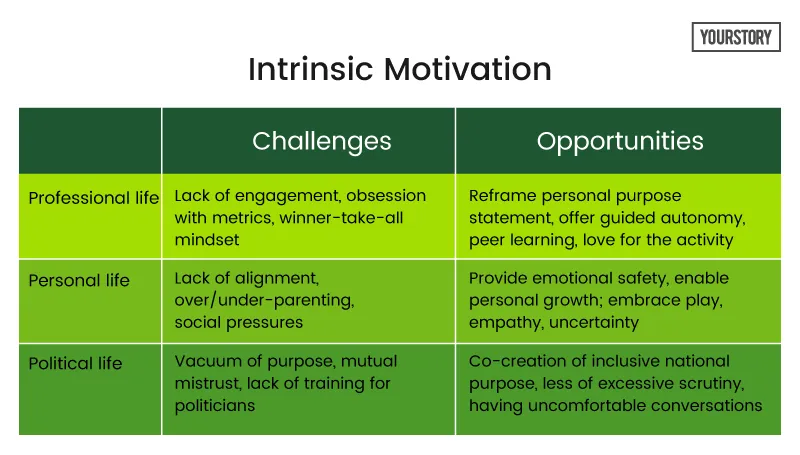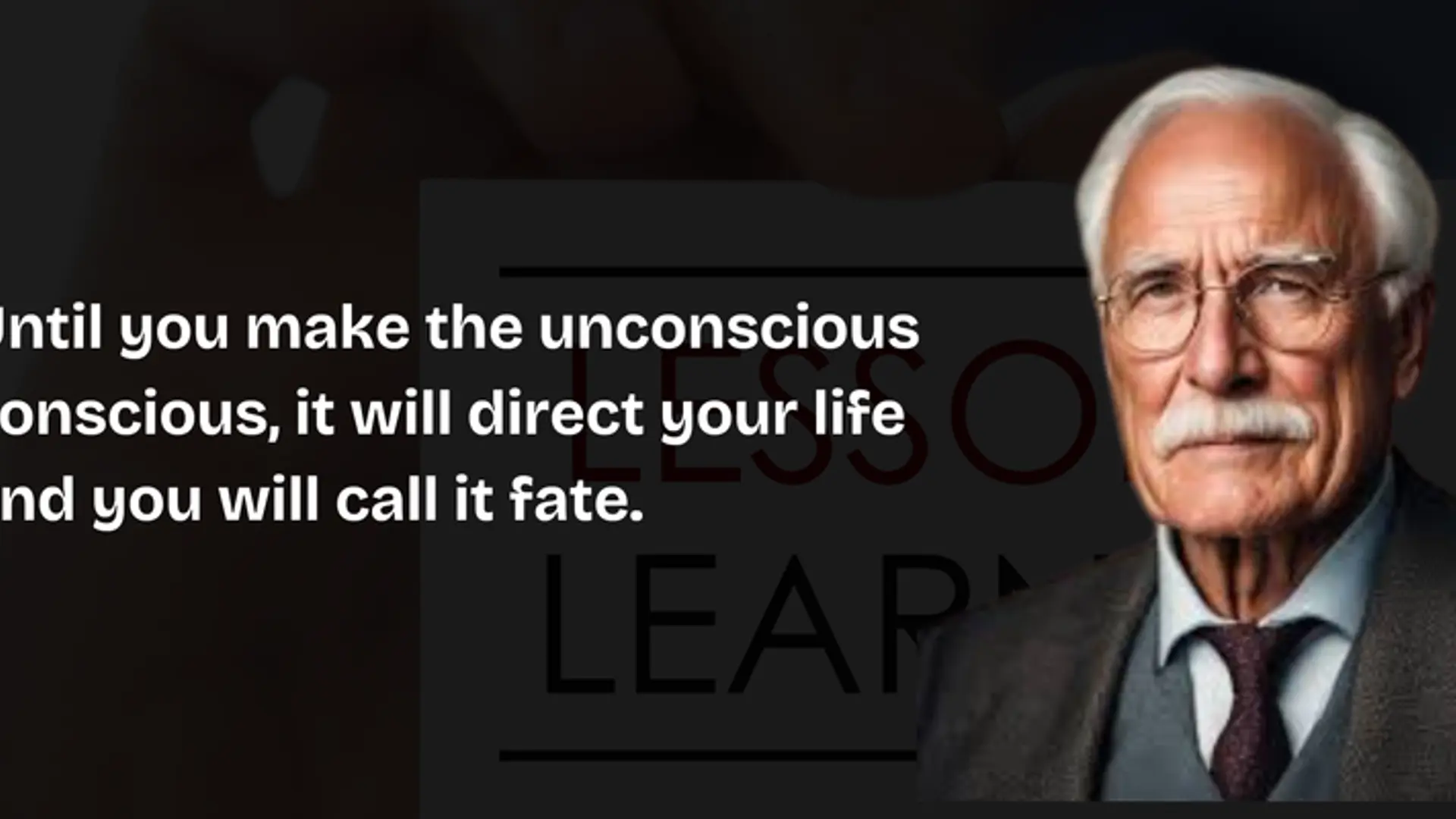Purpose, autonomy, mastery: How to rekindle your intrinsic motivation
This new book shows you how to unblock challenges in professional, personal, and political life. Here are some key takeaways.
Launched in 2012, YourStory's Book Review section features over 310 titles on creativity, innovation, entrepreneurship, and digital transformation. See also our related columns The Turning Point, Techie Tuesdays, and Storybites.
What are success and happiness really about, and why are we so confused or unable to inspire ourselves to achieve them? Frameworks and responses to these challenges are well explained in the compelling book, Intrinsic: How we can re-ignite our inner drive, by Sharath Jeevan.
The book draws extensively on his entrepreneurial and leadership experiences in the UK, India, and Indonesia. The seven chapters are written in storytelling style and are thoroughly referenced, with 28 pages of sources.
Sharath Jeevan is the Founder of STiR Education, which works with 200,000 teachers, 35,000 schools, and seven million children in emerging economies. He is also the Executive Chairman of Intrinsic Labs, helping organisations solve deep motivational challenges.
Here are my key takeaways from this valuable 340-page book, summarised in the sections below. See also my reviews of the related books Ikigai, Think Again, Multipliers, Culture Code, Why People Give, The Creative Curve, and Kaizen.

Foundations
“Purpose is about knowing how what you do helps and serves others. Autonomy is believing in your ability and agency to actually change things for the better. Mastery is the sense of being on a continual, almost infinite journey of improvement towards being the best version of yourself you can be,” the author defines.
Sharath first stumbled across the importance of these concepts when he founded STiR Education in New Delhi’s slums in 2012. His team was bringing teachers together to share best practices and connect through games and discussions. The activities unearthed their strong sense of purpose, control over teaching methods, and improvement through knowledge sharing.
While much attention understandably focuses on extrinsic motivators like pay, rewards, awards, perks, and incentives, Sharath argues that these are eventually “hygiene factors.” They may reduce demotivation, but do not sufficiently increase motivation.
“Intrinsic motivation, by contrast, is about going on a journey because it’s inherently satisfying, rewarding, and enjoyable in its own right,” he describes.
In this journey, there are strong interconnections between purpose, autonomy, and mastery. Success and happiness derive from nurturing intrinsic motivation, cultivating a growth or abundance mindset, reframing existing metrics, and embracing the uncertainty ahead.
Five chapters in the book address work, success, relationships, parenting, and citizenship, which I have clustered into professional, personal, and political life in the sections below.

I. Professional life
While pay needs to be fair and just, blocks to true motivation come from excessive bureaucracy, silo structures in large firms, over-specialisation, lack of engagement, and stress. Even work flexibility and good workspaces have their limitations as motivators.
Too much of a focus on metrics can take time away from the precious human connection in fields like education and healthcare, Sharath cautions. This can even lead to phenomena like “gaming” the metrics and cheating.
There is more to sports and education than the “winner takes all” mindset or the “talent treadmill,” he observes. There is no linear path to success either, it is more like a zig-zag with uncertainty and failures along the way.
Success comes not just from grades or salary, but from building new habits, insights, connections, and spaces, Sharath argues. Unfortunately, family and social conditioning leave many with the feeling their “life script” is already written beforehand.
The author urges people to reframe, articulate, and improve their own personal purpose statement in terms of social impact. He cites Unilever and Second Home as organisations with a good focus on purpose and mastery (for example, lessons learnt sessions, improvement forums).
Dutch social care organisation Buurtzorg lets frontline nurses sense local trends and needs and build up targets and budgets. STiR practices “guided autonomy” for its teachers in terms of awareness and implementation of good practices.
The Economist accepts that its writers can develop different interests over time, and lets them move around. Its “ideas culture” allows open discussion across the board.
Google’s 20 percent principle helps employees free up time to explore and develop broader mastery. The education systems in Finland and Singapore allow teachers to spend some time together in planning and trying out new activities.

In the field of entrepreneurship, success for an incubator comes not just from spotting talented teams but also from nurturing and mentoring them. Current and earlier entrepreneurs can offer valuable peer support.
Passion Capital’s general partner Robert Dighero picks founders not for the sector they are in, but for their passion and resilience. Legendary VC investor Vinod Khosla sees himself as a “critical friend” of founders, favouring “brutal honesty over hypocritical politeness.”
He favours founder culture over “good management.” This principle is also described in the book The Founder’s Mentality (see my book review and author interview).
Many entrepreneur stories are presented as if they were a straight line. “Success in entrepreneurship is knowing that the dark side will inevitably come,” Sharath cautions, referring to crises like funding shortages or making decisions that upset others.
The JKS Restaurant Group has spawned a series of diverse culinary experiences. Its restaurant founders are given sufficient autonomy and independence.
Promoting mastery in one skill can also spill over into others and increase overall confidence, as shown in Morpeth School’s focus on table tennis championships. They had a multiplier effect via transferable skills and mindsets.
The Ford Foundation’s BUILD programme and the Peery Foundation support a “grantee centric” approach. They give grantees access to expertise and funding, without directing their strategy.
Autonomy support, job crafting, and stretch opportunities are other good practices highlighted by the author. “Where possible, make learning smart essentials a collective, sociable and ultimately fun experience,” he recommends.
“The love of the activity itself should be paramount,” Sharath affirms. Learning to learn, love for learning, and lifelong learning are key in this regard.

II. Personal life
Two chapters address challenges in personal and social life like online dating, choosing a life partner, dealing with divorce, helicopter/tiger parenting, absentee parenting, and parental narcissism.
Research shows that self-discovery, self-esteem, personal growth, and authenticity are becoming important in relationships. The author advises couples to also spend time with wider friends, family and acquaintances, and engage with the local community.
“The core purpose of a relationship is to provide us with a sense of emotional safety, a sense of attachment,” Sharath describes. Better listening and support for some autonomy help in this regard.
Over-protective parenting, “snowplough” parenting, and an excessive focus on coaches, tutors, and even counsellors can be restrictive for children, he cautions. Immigrant parents often put excessive pressure on their children to become more competitive. But grades, trophies, and schools for admission should be seen as hygiene factors and not the ultimate goal, Sharath advises.
There should be more emphasis on play, unscheduled or open times, and nurturing behaviours that promote concern and empathy for others. Goals should be jointly set by parents and teachers. Curiosity and critical thinking should be promoted, even though some such parental practices may be derided as “panda” parenting.
“Schemes, like Teach for India and Teach for America, have given many graduates a much greater connection to the world and a sense of moral responsibility for making a difference to it,” Sharath observes.
Supporting children’s autonomy benefits them and parents in the long run, Sharath affirms. This applies to their space, time, diversity of people they meet, and decisions where they give inputs.
Parents are important role models, but it takes effort for some to share their vulnerabilities in front of their children. Online forums provide useful insights for parents, but they need not compare themselves too much with others, Sharath adds.
“Our key purpose as parents is to help our kids embrace, master – even revel in – the zig-zag of life,” he affirms.

III. Political life
In the field of politics, money and power are hygiene factors for politicians, but corruption and narcissism can come in the way. At the same time, citizens need to change their motivation and behaviour to collaborate with fellow citizens and politicians, Sharath advises.
At the heart of the Brexit crisis was a “huge vacuum of purpose,” he laments. Political deals are often pitched as a zero-sum game, and social media seem to amplify the tribal, dysfunctional politics of our times.
Countries with high socio-economic inequality and low intergenerational mobility have the most populist movements, Sharath observes. Examples include the US, UK, India, Brazil, and Philippines.
Distrust of political leaders leads to excessive scrutiny in mainstream and social media. Sharath calls for more channelled and guided autonomy of political leaders and parties, a move away from a “blame and cancel culture” as citizens, and provisions for guaranteed basic income.
For mastery, there should be better management and professional training for politicians, a sector where there are no clear standards and accreditation. In this regard, the Harvard Ministerial Leadership Programme provides a platform for peer learning for ministers across countries.
“We also need to invest in mastery as citizens ourselves,” Sharath urges. This includes having open and sometimes difficult conversations with fellow citizens and dealing with uncomfortable topics.
Ultimately, politicians and citizens should move away from intense distrust. They need to co-create and live by a truly national, inclusive, and equitable purpose and vision.
Traditional and social media also play a key role in politics. It would have been great for the book to have some discussion on improving media purpose and ethics and staying away from hate speech, fake news, and collusion.

The road ahead
The concluding chapter ties all the material together and shares four valuable tips for leading an intrinsically motivated and inspired life.
Calculate the cost of your inaction. See the intrinsic opportunity. Manage against the extrinsic downside. Take small steps towards a better direction.
The pandemic has been a wake-up call for us to reevaluate our priorities in life. Standing up for a purpose requires articulating it and developing confidence in the face of criticism, Sharath observes. Taking independent exploratory and incremental steps helps solidify the purpose and skillset.
“Reigniting, reframing, and recrafting” your professional, personal, and political life can lead to a fulfilling and rewarding life. Thus, it is important to find nurturers for oneself and eventually become nurturers for others as well, Sharath signs off.
In sum, this is a valuable book for business professionals and all stakeholders in social and political life. Each chapter is packed with a wealth of stories, examples, and tips. We look forward to future publications from this inspirational entrepreneur-author.
YourStory has also published the pocketbook ‘Proverbs and Quotes for Entrepreneurs: A World of Inspiration for Startups’ as a creative and motivational guide for innovators (downloadable as apps here: Apple, Android).
Edited by Suman Singh




![[Product Roadmap] How Able Jobs built a skilling platform that helps over 1M people prepare for their first jobs](https://images.yourstory.com/cs/2/a9efa9c02dd911e9adc52d913c55075e/PR-09-1632823467556.png?fm=png&auto=format&h=100&w=100&crop=entropy&fit=crop)


![[Monday Motivation] Meet this doctor couple from Maharashtra, helping over 300 destitute women](https://images.yourstory.com/cs/5/79900dd0d91311e8a16045a90309d734/DoctorCouple3-1632678178889.jpg?fm=png&auto=format&h=100&w=100&crop=entropy&fit=crop)



![[Weekly funding roundup Feb 8-14] VC inflows see a sharp rise](https://images.yourstory.com/cs/2/220356402d6d11e9aa979329348d4c3e/WeeklyFundingRoundupNewLogo1-1739546168054.jpg?mode=crop&crop=faces&ar=1%3A1&format=auto&w=1920&q=75)
